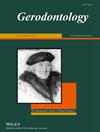Binge drinking and oral health-related quality of life in older adults: Socioeconomic position matters
Abstract
Objective
The objective of the study was to investigate whether the association between binge drinking and oral health-related quality of life (OHRQoL) differs by socioeconomic position (SEP) in Brazilian older adults.
Background
The adverse health effects of alcohol consumption disproportionately affect socioeconomically disadvantaged and older individuals. Moreover, measures of binge drinking may capture different domains of the association between alcohol misuse and health that might be independent of the traditional markers of volume or frequency of consumption. Evidence of the association between alcohol use and oral health outcomes has failed to consider binge drinking and possible effect modification by SEP.
Methods
We conducted a secondary cross-sectional analysis using the baseline data from The Brazilian Longitudinal Study of Ageing (2015-2016). Effect Measure Modification analyses using multivariable Poisson regression models tested whether the association between past-month binge drinking and higher scores of the Oral Impacts on Daily Performance (OIDP) questionnaire differed in magnitude by level of household wealth and educational attainment, assessed using Relative Excess Risk due to Interaction (RERI) and simple slope test.
Results
The analytical sample comprised 8857 individuals. Participants who were from low-wealth households or with lower education and reported past-month binge drinking had 27% (95% CI: 1.16 to 1.39) and 28% (95% CI: 1.18 to 1.40) higher OIDP scores, respectively, than those not binge drinkers from higher SEP, and super-additive associations were detected (RERI for household wealth: 0.12; RERI for educational attainment: 0.14).
Conclusion
Binge drinkers from low SEP have poorer OHRQoL. Public oral health initiatives aiming to combat binge drinking are likely to disproportionately benefit vulnerable groups.

 求助内容:
求助内容: 应助结果提醒方式:
应助结果提醒方式:


